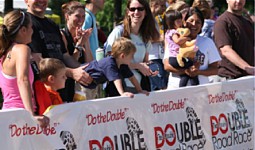UjENA FIT Club Running Interviews and articles with 100 Interesting People
Best Road Races and the UjENA FIT Club is speaking with 100 people who we feel have a lot to say about running, racing and fitness We will give you background information as will as their insights into the future. Be sure to post your feedback and comments.
Read All UjENA FIT Club Running Interviews
Posted Thursday, February 19th, 2015
by Bob Anderson, publisher of Double Runner magazine (Photo Bob Anderson with world record holder Julius Koskei wearing the yellow... Read Interview
Posted Monday, March 17th, 2014
The Chris Jones story is a running saga of epic proportions. Don't try this at home! (Photo - Leadville 100... Read Interview
Posted Sunday, March 23rd, 2014
Aging ever so gracefully at age 59 and forging a career record that becomes ever more impressive, Sharon Vos is... Read Interview
Posted Tuesday, November 5th, 2013
By David Prokop Editor Best Road RacesJulius Koskei (pronounced Kos-kay), who set the current world record in the Double Road... Read Interview
Dr JoAnn Dahlkoetter Interview 26
Tuesday, April 10th, 2012
"I believe that running and performing well is 90% mental"
Dr. JoAnn Dahlkoetter, is CEO of Performing Edge Coaching International Association, and founder of Dr JoAnn.com. She is the author of the best-selling book Your Performing Edge, sports psychologist to Olympic Gold Medalists and winner of the 1980 San Francisco Marathon. She is an internationally recognized Olympic Keynote Speaker, columnist, and TV expert commentator. I have know JoAnn for many years but I can't say that we spent that much time together until recently. I have always felt that the mental side to racing was just as important as being physically ready. Dr. JoAnn has provided some aids to help me focus before races and during. A little extra coaching does help. (Interview by Bob Anderson)
1. You won the 1980 San Francisco Marathon. You beat your PR by 20 minutes? Just three weeks earlier I had taken 10th place overall in the Cascade Runoff 15 K race in 53:52, which was about a 5:45 pace, which was a quantum leap for me. That race brought in a world-class field with the best runners internationally, including Joan Benoit Samuelson and Patti Catalano. So that 15 K race gave me the confidence and set me up and to run a 2:43:20 marathon, break the course record by over 6 min., and run the 19th fastest time in history for an American woman. After that race I received invitations and appearance fees to compete in races all over the world – very exciting. I got a nice sponsorship by Nike for travel, gear, and everything I needed. 2. Soon after that you pulled up with a stress fracture in your tibia. With all your positive thinking, how did that happen? The lesson I learned from that was to listen to my body’s needs and take care of myself first, regardless of what others are telling me. 3. You then focused on swimming and cycling and went on to placed second in the October, 1982 Ironman competition. When I was training for my first Hawaii Ironman Triathlon, I had never attempted an event of this length. I used imagery to prepare mentally and build my confidence going into the race. Every night for six weeks prior to the race I would spend fifteen minutes visualizing the event. On race morning, I completed the swim easily. However, the long grueling bike ride through black lava fields took its toll. When I completed the bike ride and dismounted I felt horrible. I had swum 2.4 miles, and cycled 112 miles in 100 degrees weather, with 90 percent humidity. The sun was beating down during the hottest part of the day. I left the bike transition area and began walking the marathon course. I told myself: “26 miles, yeah right. There’s no way I’m going to finish this. I might as well pack it in right now.” I was doing a superb job of talking myself out of the race. Then a woman passed me whom I had beaten in several other races. I said to myself, Oh God, even she is passing me. She looked back and said, “Hey Dahlkoetter, you’re walking!” That’s probably the best thing that could have happened. I was angry. I said to myself, “I’ve got to do something major here to get myself going.” I pictured in my mind a time when I felt really good on a run – the San Francisco Marathon. I visualized myself feeling powerful, relaxed, and focused. I remember the race conditions were perfect that day. The weather was cool and I was mentally and physically prepared. My legs felt strong and I was in “the zone”. When my consciousness shifted back to the Ironman, I found myself no longer walking. I was running well; the crowd was cheering – you look great. After completing that mental imagery process early in the run, I realized that I could go on, and possibly finish my first Ironman Triathlon. I continued to gain momentum, feeling stronger with every mile, as I moved up in the ranks. At that point, nothing could stop me. I had begun the run in 19th place, and eventually finished as 2nd woman overall – a race I will remember forever. The visualization had transformed my entire outlook and empowered me to run the race of my life.
Mental training is so important that I’ve made it my life’s work to develop leading edge techniques and train athletes and coaches in my sports psychology methods that truly work to create success in achieving one’s goals. I’ve found, just like we work out our bodies, we also need to exercise the brain. Mental training is like taking your brain to the gym. We want our bodies to have many different gears and speeds. We also need the mind to be flexible – to be able to shift into different gears depending on the task at hand. Mental imagery is a powerful tool for achieving this purpose. 5. When a runner is at the starting line of a race, what should they be thinking? Power Words to say BEFORE a Race: I gain energy from other athletes in my race. Racing gives me a chance to celebrate my fitness. We can all help each other do our best in this race. In this event I can be towed along to a new personal record. I am well prepared, rested, and ready for this event. I am strong and relaxed, at the end of the race. I love competing, I am totally focused. Power Words to say DURING the Race: I am laser focused on this race. I’m staying in a relaxed flow in the 2nd half of the race. Doing well comes easy for me. I'm running fast and smooth with confidence. The second half of the race becomes easier and easier. I hear the cheering of the crowds carrying me forward. I enjoy running and doing my best when it counts the most. My body is getting stronger with every step. I believe in myself, I radiate an inner confidence. I have all the tools and resources I need inside to perform my best. Every step in getting closer to the finish line. My motivation and drive are growing stronger every moment. I'm improving with every step. 6. I really liked your idea of thinking that the person or finish line ahead is like a magnet. I have used this technique many times to move ahead into the lead in triathlons and marathons. Using the mind in this way allows you to take the pressure off, and have more fun with your racing. You’ll find that your competition will appear less threatening because you can stay in contact with those that normally pull away in races. You’ll be able to maintain a steady pace while using less energy, and sustain concentration for longer periods.
This book presents a comprehensive step-by-step program, with the latest psychology tools for optimal mind-body performance. I give you methods to focus your energies, overcome obstacles to excellence, and perform your best. It’s filled with easy-to-follow steps, engaging stories and profound wisdom for personal performance. I’m excited that corporations and health-fitness industry professionals worldwide now use this book and audio programs as their standard reference. It’s a comprehensive guide that contains all the techniques I teach the pros, including training tools, templates, and exercises so you can align your performance with the vision in your heart. 8. When did you first realize you loved running? I also combined running with many other sports such as surfing, rock climbing, cross-country skiing, skydiving, kayaking, the more extreme the better. 9. Tell us about your first race? 10. Is there a race you will never forget? Each night after riding 100 miles per day, we would have to find a grocery store, buy all our food to prepare for the next three meals and find a campground. Then we have to set up camp, get out our camp stoves, cook our dinner, wash dishes, and sleep in our tents on the hard ground. Then the next morning we'd have to break camp, pack everything up, get on our saddles, ride 100 miles, and do it all over again every day for 56 days. We made memories and friendships during that event that I still keep to this day, and will always remember. 11. When you were racing at your peak, tell us about your workouts. I remember I was doing one of my best workouts on the track in Portland in the summer of 1980. In the middle of one of my best intervals we all looked up in the sky and it looked like Hiroshima. Mount Saint Helens had just erupted for the first time, and it was the most amazing sight to see. That was just a couple weeks before the cascade runoff and the San Francisco marathon, so maybe it was a sign that my running career was about to explode as well. 12. Were you doing anything special with your diet? 13. How about weight training? 14. You work with a lot of top athletes, is there one basic thing you tell them all? One of the things I tell them all is - mental performance is the key. Developing your confidence is critical. I have a whole program that I take them through, and I do my coaching mostly by phone so location doesn't matter. I have clients and athletes of all levels that I'm working with over the world - half of them are high school and college kids, and half are adults. A lot of sports parents call me as we work with their child – they often say “My kid can do it in training he just can't do it when it really counts. ” Or he sabotages his performances by doing something counterproductive. One thing that I tell all of them – both kids and adults, is to: “Visualize to energize” Take time each day to see yourself doing it right. So often we repeat the mistakes we've made over not and over in our minds and the body follows those mental instructions. There's so much negative chatter going in our minds all the time. We need to be constantly finding ways to stay positive and to stay focused on our goals. Right before you go to sleep at night, take those last 5 min. before you drift off to place into your mind exactly what you want to achieve the next day, feel the way you want to feel. Is helpful if you can play video or audio modeling exact behavior and thoughts feelings that you want to have. So for instance if you want to run well, 5 min. before you go to bed, play a video of a runner that you really admire. Then will the last thing you're thinking about before you go to sleep, you will tend to dream about. Your subconscious mind will be working on this for the next eight hours. So you are really getting in 8 more hours of powerful training. 15. I was most impressed with the Your Performing Edge Visualization CD you gave me. How can this be used to improve performance? This Visualization CD is a Companion to the best-selling YPE book with exercises to help you practice what you are learning in the book. I’ve seen so many people create major breakthroughs in business, fitness, health, and life – and prosper at all levels in any activity. It’s meditations and Music for a healthy mind, body, and spirit. 16. You majored in psychology and music therapy. It seemed like the music you selected for the CD was just as important as the words? When creating the CD, I tried hiring other musicians to create the kind of music I wanted. But I was very particular. I needed a very special kind of music that complemented the visualizations and went along with my voice. Since I have a background as a musician myself I realized that I could create this very powerful music myself and have exactly the kind of psychological mood that I wanted to achieve. So I purchased a synthesizer, and created, performed and recorded the music for each visualization. Comments and Feedback
 Thanks Bob for interviewing me, you did an amazing job, I loved your well-thought-out questions. It was an honor to be interviewed by you. And I'm excited to be part of your performance team for your 50 race quest. http://www.PerformingEdgeCoach.com Thanks Bob for interviewing me, you did an amazing job, I loved your well-thought-out questions. It was an honor to be interviewed by you. And I'm excited to be part of your performance team for your 50 race quest. http://www.PerformingEdgeCoach.com Joann Dahlkoetter 4/11/12 9:41 pm |
,,,,, |
Photo: JoAnn on a training run in Los Altos Hills with me, Rich Stiller and Bill Dunn earlier in the year. Photo by Waitman Gobble Ujena Fit Club 17. Has it been tough to get people to listen to your advice? I get calls all the time from sports parents and athletes of all levels, at all ages, in a variety of sports. And I've had the opportunity to work with just about every kind of mental and physical challenge you can think of, in my private practice over the last 30 years. 18. How many other people are doing what you are doing? It's truly one of the most satisfying things I've ever done in my life - training these coaches, and helping them to help more athletes be successful with their goals. It's passing on the knowledge and experience that I have gained over the last 30 years as a sports psychologists so that these methods can have a much broader reach worldwide. 19. When a person gets tired in a race and is fallen off the pace, what should they be thinking? So if you're getting tired a race, you can have a physical movement that you've preplanned, such as patting your hand on your thigh, or snapping your fingers, and say to yourself STOP. Then breathe out the negative thoughts. And with your next breath breathe in which you want to be thinking. (e.g. I am getting a second wind, just focus on this one-mile, only five miles to go). 20. Break down a half marathon for us. How do you think it should be run? So take a piece of paper, and draw a vertical line down the middle. On the left-hand side, at the top right Negative Thoughts and Self-Doubts. On the right-hand side of the top right Power Words-Positive Reframing. Then when you're training week before the race, as each negative thought comes up write it down the left-hand side of your page. Then immediately go to the right-hand side of the page. Ask yourself what's the opposite of that? What do I want to be thinking? How can I coach myself through this? What's the most positive thing I can say to myself to handle the situation? Write all of those power words and thoughts down on the right-hand side of the page. Memorize those words. These become the phrases that you will use when you get tired during your half marathon him. I often tell my athletes to write down your power words on a card, or in your hand, or on your race number, or even on your thigh (whatever it takes) then say one power phrase during each phase of the race. (Have one power word phrase for mile 3, one for mile 6, mile 9, 11, 12, and so on. Give yourself more power phrases during the latter parts of the race when you'll be the most tired. 21. Can a person run a good race even when they are not in the best of shape? The mistake most people make is they focus on the external conditions that they cannot control. The key is to focus on only those things that you can control - your breathing, your pacing, your mental attitude, what unique the night before, your sleep patterns, your focus, your confidence, your belief in yourself. We focus on those things you can control and especially your mental performance then I think it is probable that you can run a good race and get the best out of yourself even when you're not in the best shape. 22. What can an average person do to run faster? Then you be able to run faster during races because you be more covered and have less chance of injury. Of course I think it's key to practice your mental training just as much is your physical running, as there's no limit to what you can achieve and how much mental training you can do. However there is a limit to how much running you can do without your body breaking down. 23. Are you still racing? 24. What running goals have you set for yourself? 25. How important are goals? Photo: JoAnn and I on a training run with Bill Dunn April 8. 26. How can a person get back their mental focus in the middle of a race? When you’re doing a race, for example, the right focus depends on what is happening at that moment (e.g. getting to the half-way point). So concentration becomes dynamic and changes according to particular challenges of your event. Knowing what to focus on is a skill that you can develop with time and experience. As you encounter a variety of scenarios, you can store your responses in memory, and improve your ability to take action. You’ll learn to return your focus to what’s relevant more quickly. 27. Do you believe in going out fast in a race? But that is very difficult to do and so the next best goal is to keep as even a pace as possible throughout the race. That way you’ll be the most efficient and comfortable. The shorter the race the more aggressive you can be in going fast in the first mile. 28. How important is the hour before a race? As a sports psychologist and top runner I've seen the whole gamut of pre-race reactions - everything from people getting so nervous that they are throwing up, see people talking negative about the race “I'm injured, I never run well in the rain,” My biggest competition is here so I won't win my age group, “I ate so bad last night, my hotel room was too noisy, “I hate this course, this race is so disorganized.” “I got here late so I couldn't warm up so I just blew my race “I have a hard time in the hills” You name it, I've heard it. Your primary concern during this important phase is to quiet the mind and regulate the flow of adrenaline so that you can achieve your optimal level of arousal. Athletes are very individualized on this issue and what works for one athlete may be totally inappropriate for you. Some athletes do their best while highly energized; others need to be more relaxed. You need to find your right level of energy. Keep a detailed post-race log for each race to find out what emotional state works best for you. Here are some suggestions for what to do the morning of your event and the hour before your race: Music: Play your favorite music tape or CD while traveling to the race, one you associate with success. Arousal adjustment: If you are too anxious, do deep abdominal breathing; if you are too unmotivated, clench your fists and take a few short, rapid, deep breaths. Do some quick movement: dance to the music. Familiarity: Follow your usual pre-race routine; don’t try anything new; and carefully attend to last minute details. Quiet the mind: Following your warm-up, go to a quiet place, breathe deeply, calm your mind, and remind yourself of how well prepared you are (e.g. Say to yourself: “I have done this a thousand times before; I am fully trained, well rested, and ready to do well”; “I perform well under any conditions”). Lighten up: Enjoy the event (e.g. Take your mind off the race for a few moments; think of your favorite comedy scene; tell a joke to a friend; remind yourself that this is just another race, not a life or death situation). Oxygen supply: 30 seconds before the start gun, take ten deep abdominal breaths to relax and improve mental clarity, and to increase oxygen supply to the muscles. 29. What do you think you should have done different after winning the SF Marathon? I was young and inexperienced at the time. I didn't realize that my body was really torn down and need extra rest and recovery before doing my next 5K race. The lesson is, rest is best. 30. Did you know at the time that you would never run a marathon faster? 31. You’ve done a lot of amazing things, what stands out in your mind? And then to be able to train other coaches with my Performing Edge Coach certification program, to pass my expertise and experience to others (like passing the Olympic torch) so they can help more people with these powerful sports psychology performance techniques.
33. You done a lot of cycling. Is your approach toward cycling any different than running? When I bike I do a lot of standing up on the pedals. I get off the saddle and I go into harder gear and I ride off the saddle for many intervals. This simulates the running motion builds strength in the calves, hamstrings and glutes and arms, and I think it really helps to support my running. 34. What if you had not found running? 35. Is helping others just as important as doing well yourself? 36. What advice do you have for me to achieve my goal of 350 miles averaging under 7 minute pace? You need to take into account all the components of your 50 race challenge, (Mental, physical, nutritional, recovery, travel schedule logistics, gear, etc.) Most athletes would only think about the physical training. To do this right I think you need to consider all the different elements of a successful training and racing plan, and put them all together. Right after you finish one race, write down the learning points, what went well and what you could have done better. Ask yourself how can I apply what I learned in this race to the next race? Then let go of any disappointments or mistakes that you made in your past race and begin to focus right away on your next race and how you can make your next race as good as possible.
38. What's ahead?
|

Copyright 2025 UjENA Swimwear · Site Map · Feedback · Tell A Friend · Nominate a Race
Leaderboard · UjENA 5K · Double Road Race · UjENA Jam · UjENA Network














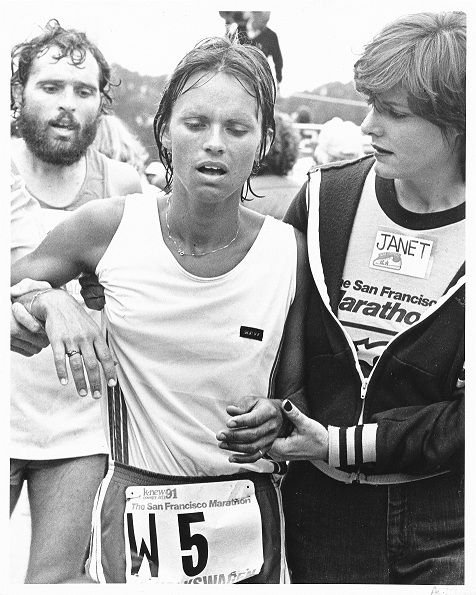 Photo: JoAnn after running 2:43:20 at the San Francisco Marathon.
Photo: JoAnn after running 2:43:20 at the San Francisco Marathon. 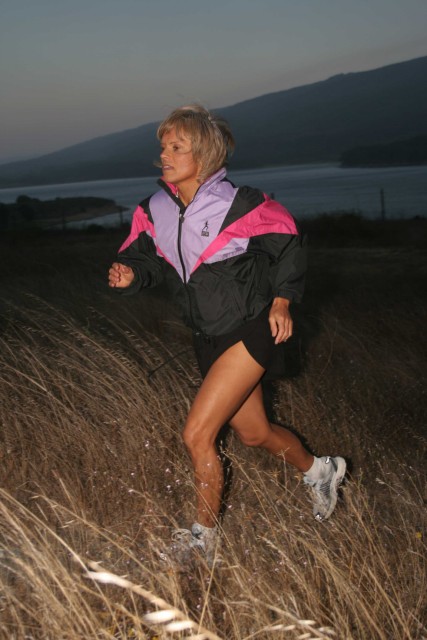 4. How important is the mental part of running?
4. How important is the mental part of running?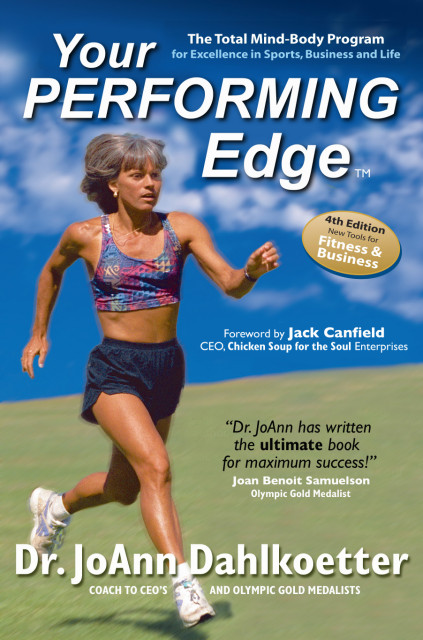 7. Tell us about your book "YOUR PERFORMING EDGE"
7. Tell us about your book "YOUR PERFORMING EDGE"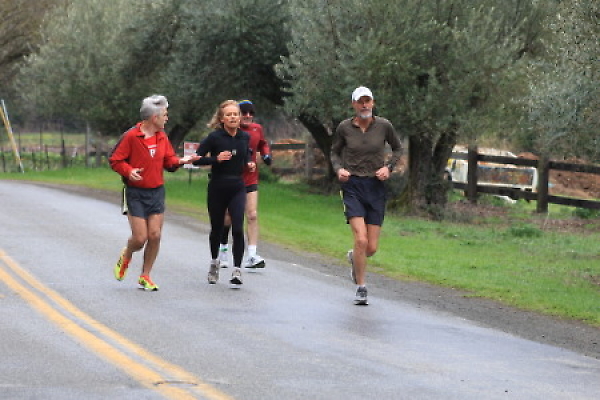
 32. You were on Oprah. What was that like?
32. You were on Oprah. What was that like? 37. Are you happy with what you have achieved so far?
37. Are you happy with what you have achieved so far?